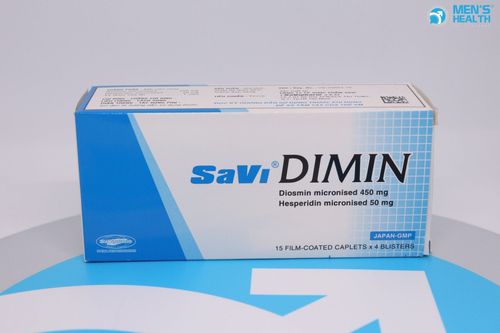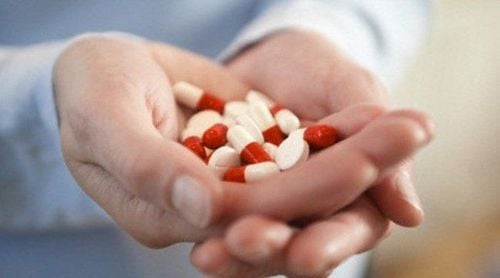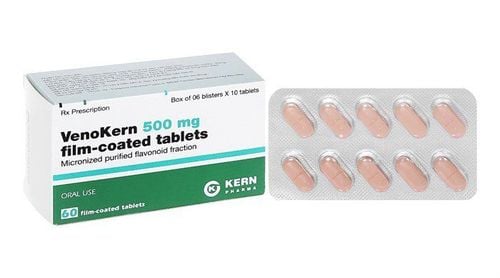This is an automatically translated article.
People with hemorrhoids tend to feel guilty, delay the examination, so by the time they see a doctor, the disease has reached a late stage that requires surgical intervention. Meanwhile, without proper care in the postoperative period will face many risks of complications. Check out some of the ways to treat hemorrhoids after surgery right below!
1. Some information to know about hemorrhoids
Hemorrhoids form due to dilated veins in the rectal and anal areas, causing the patient to feel pain, itching and bleeding when defecating. This is the most common disease in anorectal diseases, with a prevalence in adults about 10-25% of the population and accounting for more than 50% of the age 50, common in both men and women.
Some severe cases of hemorrhoids can cause the hemorrhoid to rupture leading to severe blood loss. Hemorrhoids are divided into 3 types: mixed hemorrhoids, internal hemorrhoids and external hemorrhoids. At the same time, it is also divided into 4 stages:
Stage 1: the pathological manifestations are not clear. At this stage, the patient may bleed when having a bowel movement, but very little, so it is difficult to detect. Stage 2: The patient can feel the blood in drops when defecating. In addition, there may be mucus discharge and sharp pain around the anus. Stage 3: From this stage, the patient must have surgery. Symptoms of this stage often progress quickly such as bleeding that does not stop, hemorrhoids that do not shrink on their own, thick mucus secretion and burning pain around the anus. Stage 4: the patient will face many dangers such as anemia, infection, necrosis of hemorrhoids, ulcers, etc. if not operated on time. In stages 1 and 2, patients may be prescribed oral or topical medications for treatment. Patients in stages 3 and 4 or have dangerous complications such as embolism, bleeding ..., doctors may recommend surgery to remove hemorrhoids.
2. How to treat hemorrhoids after surgery
Treatment of hemorrhoids includes nutritional adjustment, medical treatment and surgery. In particular, surgery is the most effective and definitive treatment for hemorrhoids.
After surgery, the anal area can be painful for up to 1 month. However, after the first 1 to 2 weeks, the patient can return to normal activities. Some ways to treat hemorrhoids after surgery can refer to:
2.1. Diet after hemorrhoid surgery Eat soft foods, supplement with fruits and vegetables containing many vitamins and fiber such as sweet potatoes, cauliflower, tomatoes, ... and protein-rich foods such as: lean beef, chicken breast, ... to make the intestines work easily and reduce the possibility of having hemorrhoids after surgery; Drink a lot of water (about 2 - 2.5 liters of water/day) to facilitate the digestion process, avoid constipation; Stay away from greasy fast foods, hot spicy or raw, undercooked foods; Do not use alcohol, tobacco, coffee or stimulants. 2.2. Daily anal hygiene Practice the habit of defecation in a fixed time frame, do not push when constipated. Soak the anus with warm water mixed with an antiseptic solution daily for about 10-15 minutes, gently wipe, avoid strong impact that can cause pain or bleeding; Always keep it clean and dry. It is recommended to use soft wipes instead of toilet paper to avoid leaving debris that causes infection; When lying down, the buttocks should be raised to avoid swelling in the anal area. 2.3. Adjust daily living habits Lightly exercise in daily activities, immediately rest when you feel tired. Limit squatting, do not run, jump or carry heavy objects to minimize the impact on the wound. Do not choose intense sports, but just go for a light walk. Do not ride a motorbike within the first 1-2 weeks after surgery to avoid friction and cause bleeding. Abstain from sex until the incision is completely healed. The impact or stimulation during sex is easy to make the incision bleed, cause infection, and pain for the patient. 2.4. Monitor abnormal symptoms After hemorrhoid surgery, patients need to take care of the wound very carefully according to the doctor's instructions. After about a week, there will be some blood coming out of the wound, but not too much. However, if the patient has a lot of blood in the stool, incontinence, a lot of pain despite taking painkillers or anal swelling, pus discharge, fever, ... or any other abnormal signs, need to Contact your doctor immediately for prompt treatment.
In addition, the persistence of treatment and scheduled follow-up with the doctor also helps the patient to take good care of and monitor the incision. This also helps doctors to detect abnormal signs in time so that they can be treated promptly, avoiding harm to the patient's health and life.
Please dial HOTLINE for more information or register for an appointment HERE. Download MyVinmec app to make appointments faster and to manage your bookings easily.













